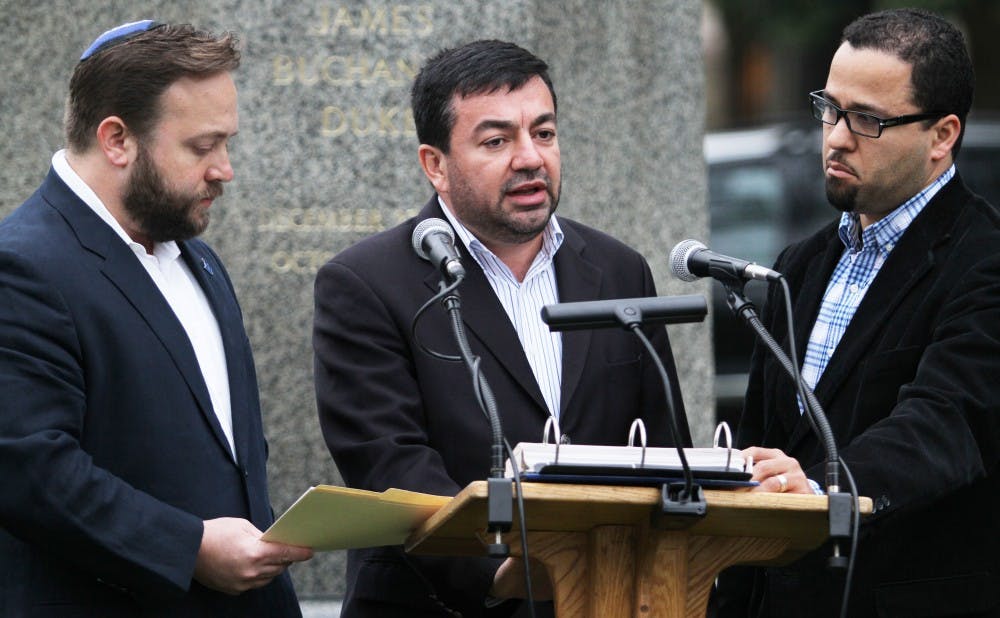Yesterday, on the Day of Remembrance of the Victims of the Rwanda Genocide, the names of genocide victims filled the air in an endless stream. Today, the air still echoes with names as we remember and vow never to forget.
For the past two years, the Coalition for Preserving Memory has hosted a 24-hour name-reading ceremony to honor genocide victims on Holocaust Remembrance Day. This year, with an expanded vision, the genocides of not only the Holocaust, but also of Armenia, Cambodia, Bosnia, Rwanda and Darfur will be memorialized through a name-reading ceremony, panel discussion, music night and art exhibition.
“The goal of CPM is to honor by remembering—to commemorate the victims of genocide of the 20th and 21st centuries and to bring the discussion of genocide on campus,” said sophomore Josephine Ramseyer, CPM’s art exhibition coordinator.
While the term “genocide” was coined by Duke professor Raphael Lemkin in 1944, CPM formed in response to the lacking campus discussion today.
CPM’s motto encourages us to “remember humanity at its worst to inspire humanity at its best.” In using the arts to remember genocide, the organization gives a voice to an unspeakable past. Through art and music, genocide becomes personal—regardless of who the person is, or what she has experienced.
“I’ve never been afflicted by genocide personally in my lifetime, but I can see it and live it through artwork…and people can all share that experience,” Ramseyer said.
Naturally open for personal interpretation, music and art allow people from all walks of life to join together in solidarity. CPM’s art exhibition, "Together We Remember," will showcase multimedia works created by various Duke students and organizations including Blue Devils United, the Duke Human Rights Center and PACE (Performance Art & Creative Engagement). In joining together these diverse groups of people, the exhibit knits together a multi-dimensional conversation about genocide.
In the past, art's innate beauty has allowed the atrocity of genocide to be remembered and understood. Similarly, history has acted witness to music’s role as a beacon of hope in times of darkness.
“Art and music are two of humanity’s finest creations, and we’re using them to commemorate genocide, which is arguably humanity at its worst,” said sophomore and CPM member Tom Vosburgh.
CPM’s music night seeks to immortalize the various cultures from around the world which have been afflicted by genocide. Taking place tomorrow at Baldwin Auditorium, the event will be highlighted by a performance by tenor Noah Stewart, the first black artist to reach No. 1 on the UK classical album charts. United in Praise Gospel Choir and individual Duke students will also perform.
“The goal of music night is to show that cultures can persevere even after genocide. There’s going to be African drumming, classical music…every piece has been specifically chosen to be relevant to this theme,” said junior Sarah Garland, coordinator of music night.
Bringing together these different cultures shows that genocide is not confined to a specific culture or people, and instead defines the history of humanity as a whole.
“The truth is that the world is so very small, and anything that happens anywhere impacts all of us—affects all of us,” Ramseyer said.
Through holding this series of events, CPM hopes to give everyone a chance to personalize the concept of genocide while also uniting everyone in remembrance of genocide’s universality.
“Together, we remember. Together, as a Duke community, we remember. As all these coalitions of people, as all these individuals, we remember,” said CPM President Eliza Meredith.
CPM will be holding its name-reading ceremony until 7 p.m. tonight. Music night is free and will be on Tues., April 7 at 7 p.m. The art exhibition, “Together We Remember,” will open in the Brown Gallery on April 14 at 7 p.m. For more information, visit the Coalition for Preserving Memory's website.
Get The Chronicle straight to your inbox
Signup for our weekly newsletter. Cancel at any time.

